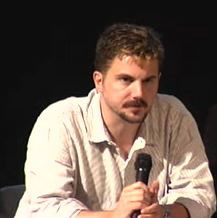February 8, 2004 - Design that Metters: Ivory Coast RPCV Timothy Prestero is a cofounder of Design that Matters
Peace Corps Online:
Directory:
Ivory Coast:
Peace Corps Ivory Coast :
The Peace Corps in the Ivory Coast:
February 8, 2004 - Design that Metters: Ivory Coast RPCV Timothy Prestero is a cofounder of Design that Matters
Ivory Coast RPCV Timothy Prestero is a cofounder of Design that Matters

Ivory Coast RPCV Timothy Prestero is a cofounder of Design that Matters
Timothy Prestero, Principal. Timothy is a cofounder of Design that Matters and the related ThinkCycle initiative. For the last two years, he has been a lead instructor for the Design that Matters course at the MIT Media Lab, leading working groups on problem identification and multilevel stakeholder analysis. He has just launched a third DtM course at the Media Lab, and he continues to consult with student teams across MIT and Sloan on their DtM projects.
Timothy is co-inventor on three pending patents for cholera treatment devices. He is a graduate of the MIT/WHOI Joint Program in Applied Ocean Physics and Engineering, holding M.S. degrees in Mechanical and Oceanographic Engineering, and a B.S. degree in Mechanical Engineering from the University of California at Davis. Timothy was a Peace Corps volunteer in Côte d'Ivoire, West Africa in the Urban Environmental Management program, where he worked as a consulting engineer and project manager for a city public works department. As a volunteer, he completed several urban infrastructure projects, and organized conservation projects and science clubs at local secondary schools. He has traveled throughout West Africa, Latin America and Asia.
Design that Matters (DtM), a Massachusetts nonprofit, helps underserved communities realize an improved quality of life by creating products and services that meet needs identified by the communities themselves.
DtM acts as bridge to bring problems identified by nongovernmental organizations (NGOs) and the communities into the classroom for university engineering and business students to tackle in their courses and research.
DtM works with NGOs, corporate partners and local entrepreneurs to ensure that promising student innovations result in products and services for communities in need. Since its launch at MIT in 2000, DtM has worked with over 300 university engineering and business students to develop dozens of prototypes that promise to improve thousands of lives.
Statement of Need
The basic needs of four billion people in the world--in areas such as clean water, health care, renewable energy and education--are not met by the global market. Communities facing these challenges include developing countries, indigenous groups, the handicapped and the elderly. Stakeholders and NGOs can articulate these community needs but often lack the technical expertise and facilities to solve them. Local entrepreneurs with innovative solutions often lack the expertise to implement and commercialize them at a large scale.
At the same time, recent changes to the accreditation requirements for university engineering programs now require a professional practice or experiential learning component in the undergraduate curriculum. This has created a strong need among faculty for real world problems to assign in their courses.
These new accreditation requirements directly impact 2,500 U.S. programs and influence programs around the world. U.S.-based university and college engineering programs alone annually enroll 500,000 students, and the accreditation requirements directly affect 110,000 university seniors.
This has created an opportunity to engage thousands of young engineering students--a group with the skills and the ability to make a difference, but who often aren't aware of their capacity to create change in underserved communities.
Design that Matters Strategy
Design that Matters works within the educational system to engender enthusiasm and commitment to working with underserved communities among university students in engineering and business. Our strategy to achieve this is to capitalize on recent changes to the accreditation requirements for university engineering programs that directly impact 2,500 U.S. programs and influence programs around the world.
These changes have created a strong need among faculty and students for real world problems to solve. They have also created an opportunity to engage thousands of young engineering and business students--a group with the skills and ability to make a difference, but who often have little exposure to the needs of underserved communities.
Design that Matters fills this need with Design Challenge Portfolios containing a well-defined problem in areas like clean water, healthcare and renewable energy identified by NGOs and stakeholders.
The portfolios also connect underserved communities that can articulate their needs to technical expertise that can help solve them. We nurture promising student prototypes that arise from this interchange to see that those with the potential to improve lives reach the communities where they can do so.

Some postings on Peace Corps Online are provided to the individual members of this group without permission of the copyright owner for the non-profit purposes of criticism, comment, education, scholarship, and research under the "Fair Use" provisions of U.S. Government copyright laws and they may not be distributed further without permission of the copyright owner. Peace Corps Online does not vouch for the accuracy of the content of the postings, which is the sole responsibility of the copyright holder.
Story Source: Design that Metters
This story has been posted in the following forums: : Headlines; COS - Ivory Coast; Engineering; Design
PCOL9985
15
.

